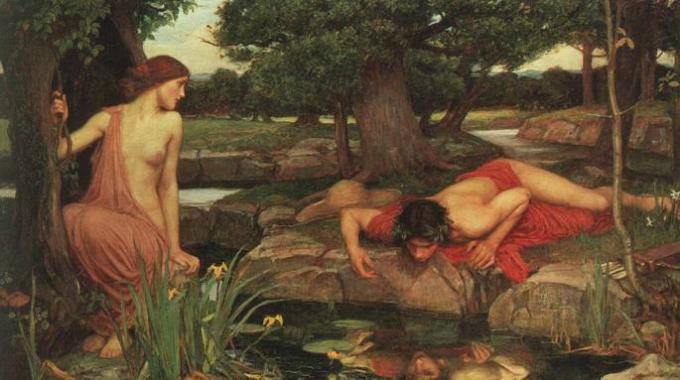The book we know today as Theogony is the compilation of a series of oral narratives that come together under the name of Hesiod and deal with the genealogy and hierarchy of the gods and heroes of Greek mythology. Currently, there is the view that mythology was created to not only explain the origin of the universe, things, man, social customs and rules, but also as an ideological instrument for maintaining the power of the aristocratic class in Greece pre-democracy. The book is composed of three main moments that are divided as we will see below:
- A Cosmogony (cosmos = universe; gonia = genesis, origin) described in an imagery the origin of the world, of nature, of inanimate beings as the foundation of reality. In this passage, Hesiod spoke of four main gods: Chaos (the undifferentiation, the chaotic nothingness that then takes shape, but is the origin of everything); Gaia or Geia or even Ge (the mother earth, fertiliser); Tartarus (the underground world, which later came to be called hell by the Christian world) and
Eros (love or desire). These four provide an image that goes from nothingness, from formless matter, through the verification of its formation with Gaia until the confirmation of the phenomenon of the emergence and disappearance of beings.From Chaos emerged Erebus and Nix (night) and from the latter came Ether and Hemera (day). From the union between Gaia and Tartarus emerged Uranus (the sky), Montes (the mountains) and Points (the sea), ending the first phase of cosmology.
The second part dealt with the sovereignty of Uranus, who united with his mother, Gaia, and spawned the Titans (Ocean, Ceos, Cryo, Hyperion, Jápetus and Cronos), the Titanids (Web, Rhea, Mnemosyne, Phoebes and Tetis), the Cyclopes and the Hecatonchiros. There are other relationships from which other gods and demigods arise. However, let's focus on the end aimed at by the Theogony.
The second part of the book aimed at what is properly called Theogony (theos = gods). One of Uranus' sons, Cronus (the god of weather), castrated his father and assumed power. From the sperm that fell into the ocean came a foam from which Aphrodite originated. Kronos married his sister, Rhea, and gave rise to the second divine generation (Hestia, Demeter, Hera, Hades, Poseidon, Zeus). The image we have is the replacement of order and peace (by heaven) by the ephemeral, transitory, transitory (time), in which beings appeared and disappeared with nothing remaining. This is because, when generating, Kronos swallowed his children. But by chance, Zeus, the youngest, was hidden and Kronos swallowed a stone believing it to be his son. Zeus grew up and also dethroned his father, Cronos, and made him regurgitate his brothers who elected him the new god-king. Zeus took power after long battles, creating a new phase.
Do not stop now... There's more after the advertising ;)
The third and last phase is the known Heroogony. Having established himself in power, Zeus' adventures began, forming through his constant sexual union with goddesses and mortals, the new generation of demigods and heroes, like their son Heracles (or Hercules for the Latinos). By having dethroned their predecessors, the gods were creating difficulties for their successors so that new dethronings would not occur. This is how Heracles was subjected to the famous 12 works.
Now, the genealogy of gods, demigods and heroes promoted the understanding of the phases of man, traditionally known as the Golden, Silver and Bronze phases. This analogy was intended to show the degeneration of man from a superior to an inferior race, thus favoring the same so that a hierarchy among the gods, the hierarchy among men, who should obey such laws, because that was how the cosmos. The ancient Greek man saw himself as part of the cosmos and not different from it, so he ended up accepting this discourse in favor of order (cosmos). The cities that were founded had names related to the deities, so the cults took place in a different in each Polis and the kings (basileus) justified their power from the descent with the gods mythological.
By João Francisco P. Cabral
Brazil School Collaborator
Graduated in Philosophy from the Federal University of Uberlândia - UFU
Master's student in Philosophy at the State University of Campinas - UNICAMP



